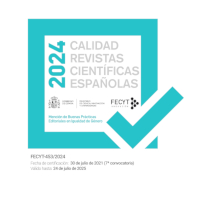Parodying editorial and journalistic styles in "Warreniana"
Another (re)vision of romanticism
DOI:
https://doi.org/10.18172/cif.5695Keywords:
Warreniana, Blackwood’s Edinburgh Magazine, New Monthly Magazine, The Times, John Bull, journal parodyAbstract
Warreniana (1824) by W. F. Deacon presents a collection of literary parodies that vary between those focusing on specific poets and their works ("poet parody") and those parodying specific styles of the Romantic press ("journal parodies"). The latter are the particular focus of this study, the former, along with the structure and nature of Warreniana, having already been analysed in a previously published study. Deacon gives more coverage to the parody of Romantic authors than to the journalistic or editorial style in Warreniana, but he also imitates them. He thus includes four parts devoted to Blackwood's Edinburgh Magazine, New Monthly Magazine, The Times and John Bull. It is these parodies together with the parody of Gifford’s editorial style that are analysed, thus completing the study of Deacon's parodic artillery to offer another picture of Romanticism parallel to the more canonical literature of the movement. In order to better understand this parody in Warreniana, and its relevance in Romanticism, we will start from the relationship between parody and the press and the analysis of significant terms such as "puff", framed in the journalistic context of marketing strategies, which is also very present in Warreniana.
Downloads
References
COMELLAS, M. (2005) “‘¡Yo quiero ser caribe! ¡Yo quiero ser romántico!’ del buen humor del anti-romanticism.” Del Romanticismo al Realismo: Actas del I Coloquio de la Sociedad de Literatura Española del Siglo XIX. Barcelona, Universitat (1998, pp. 357-37) y Alicante, Biblioteca virtual Miguel de Cervantes. https://www.cervantesvirtual.com/nd/ark:/59851/bmc154w0
COX, J. (1998) Poetry and Politics in the Cockney School: Keats, Shelley, Hunt and their Circle. Cambridge, CUP.
FELTON, F. (1972). Thomas Love Peacock. London, George Allen and Unwin.
FULFORD, R. (1967). The Trial of Queen Caroline. London: B. T. Batsford.
HULL, S. ed. (2008). The British Periodical Text, 1797-1835: A Collection of Essays. Penrith, Humanities-Ebooks.
KLANCHER, J. P. (1987). The Making of the English Reading Audiences, 1790-1832. Madison, U of Wisconsin P.
KLANCHER, J. P. (2013). Transfiguring the Arts and Sciences: Knowledge and Cultural Institutions in the Romantic Age. Cambridge, CUP. DOI: https://doi.org/10.1017/CBO9781139245937
LAQUEUR, T. (1982). “The Queen Caroline Affair: Politics as Art in the Reign of George IV”. Journal of Modern History 54, pp. 417-466. DOI: https://doi.org/10.1086/244178
MASON, N. (2013) Literary Advertising and the Shaping of British Romanticism. Baltimore, Johns Hopkins UP. DOI: https://doi.org/10.1353/book.25268
PARKER, M. (2000). Literary Magazines and British Romanticism. Cambridge, CUP. DOI: https://doi.org/10.1017/CBO9780511484414
RAMOS, M. R. (2021). “Otro romanticismo inglés: la ventriloquia de Thomas Love Peacock y el eclecticismo crítico y temático de su obra paródica”. Tonos Digital (Peri Biblión) 41.2. http://hdl.handle.net/10201/111147
RAMOS, M. R. (2022a). “P. G. Patmore’s view of Romanticism through the parody of literary reviews in Rejected Articles (1826)”. Erebea. Revista De Humanidades Y Ciencias Sociales, 12.2. https://doi.org/10.33776/erebea.v12i2.7782
RAMOS, M. R. (2023). “The Anti-Jacobin and its Parodic Strategies: Parodying Jacobin Ideas and Authors” RAEI. Revista Alicantina de Estudios Ingleses 38, pp. 131-150. https://doi.org/10.14198/raei.2023.38.08 DOI: https://doi.org/10.14198/raei.2023.38.08
RAMOS, M. R. (2022b). “W. F. Deacon and his revision of Romanticism in Warreniana through Literary Parody and Advertising Campaigns to Promote Blacking”. Miscelánea: A Journal of English and American Studies 65, pp.105-125. https://doi.org/10.26754/ojs_misc/mj.20226849 DOI: https://doi.org/10.26754/ojs_misc/mj.20226849
ROE, N. (1997). John Keats and the Culture of Dissent. Oxford, Clarendon Press. DOI: https://doi.org/10.1093/acprof:oso/9780198186298.001.0001
SHOENFIELD, M. (1990). “Voices Together: Lamb, Hazlitt and the London”, Studies in Romanticism, 29, pp. 257-72. https://doi.org/10.2307/25600838 DOI: https://doi.org/10.2307/25600838
SMITH, E. A. (1994). A Queen on Trial. The Affair of Queen Caroline. Alan Sutton.
STRACHAN, John. ed. (1999) Warreniana. Vol. 4 en Graeme Stones and John Strachan eds. Parodies of the Romantic Age. 5 vols. London: Pickering and Chatto.
TAYLOR, D. F. (2018). The Politics of Parody: A Literary History of Caricature, 1760-1830. Yale: YUP. DOI: https://doi.org/10.12987/yale/9780300223750.001.0001
THOMPSON, E. P. The Making of the English Working Class. London: Penguin Books, 1980.
WEATLEY, K. (2013). Romantic Feuds. Transcending the “Age of Personality”. Farnham and Burlington: Ashgate.
WU, D. (2008). William Hazlitt. The First Modern Man. Oxford: OUP.
Downloads
Published
How to Cite
Issue
Section
License
Copyright (c) 2023 María Rocío Ramos Ramos

This work is licensed under a Creative Commons Attribution 4.0 International License.
The authors retain copyright of articles and authorize CIF the first publication. They are free to share and redistribute the article without obtaining permission from the publisher as long as they give appropriate credit to the editor and the journal.
Self-archiving is allowed too. In fact, it is recommendable to deposit a PDF version of the paper in academic and/or institutional repositories.
It is recommended to include the DOI number.
This journal is licensed under a Creative Commons Attribution 4.0 International License














